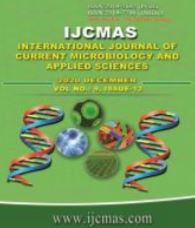


 National Academy of Agricultural Sciences (NAAS)
National Academy of Agricultural Sciences (NAAS)

|
PRINT ISSN : 2319-7692
Online ISSN : 2319-7706 Issues : 12 per year Publisher : Excellent Publishers Email : editorijcmas@gmail.com / submit@ijcmas.com Editor-in-chief: Dr.M.Prakash Index Copernicus ICV 2018: 95.39 NAAS RATING 2020: 5.38 |
This study aims to screen wild strains of lactic acid bacteria for antimicrobial activity to control the food borne pathogens as natural biopreservatives to reduce the ill effects of synthetic preservatives. The antimicrobial efficacy of 14 Lactic acid bacteria (LAB) isolated from fermented food samples were tested. Nearly 19 food borne pathogens were isolated from various spoiled food samples and were used as test organisms. The LAB cultures were characterized by Gram staining, catalase test, carbohydrate fermentation test, temperature tolerance, pH tolerance, antibiotic sensitivity and lysozyme tolerance. Biochemical analysis like exopolysaccharides production, titrable acidity, MR-VP and esculin hydrolysis were also done. LAB isolates were tested for their antimicrobial activity against 19 food borne pathogenic test organisms. Out of 14 isolates, only 5 LAB cultures exhibited antimicrobial activity by forming inhibition zone against pathogens. The zone of inhibition was recorded maximum for CS (1.33cm2) and CT (1.13cm2) isolates. The LAB strains showing maximum antibacterial activity were identified as Streptococcus thermophillus and Lactobacillus coryniformis respectively by 16S rRNA sequencing. This study was resulted in identification of LAB isolates from natural fermented foods for antimicrobial activity. The antimicrobial compounds may be of future interest which can be characterized and applied for biopreservation of foods.
 |
 |
 |
 |
 |